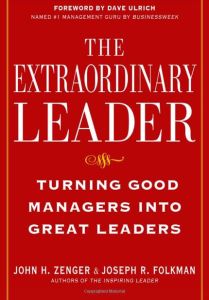
The Extraordinary Leader
Turning Good Managers Into Great Leaders
Recommendation
In this volume, two battle-scarred veterans of what might be called "The Leadership Wars" - that is, the exhaustive effort over several decades to define the elusive nature of leadership and how it can best be nurtured - present insights on leadership that are based on a series of formal surveys conducted with companies nationwide. They also present 16 core competencies that affect the perception of whether you are, or aren’t, a great leader. In many ways, they demystify leadership. Being a great leader, they tell us, isn’t a matter of genetics or tea leaves: by studying what it takes to be a great leader, you can become one yourself. getAbstract strongly recommends this book for followers who want to become leaders, and for leaders who would like to be a little less lonely at the top.
Summary
About the Authors
John H. Zenger is the vice chairman of a large performance skills improvement company, Provant, Inc. Considered an authoritative figures in the performance and leadership field, he has written or co-authored six books. Joseph Folkman, Ph.D., is the author of three books including Making Feedback Work. He is managing director of Novations Group, Inc., a Provant company.











Comment on this summary